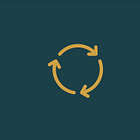Why you shouldn't follow inspiration
On deciding when to stop, deciding when to start, and teaching your brain to follow you and not your whims
Is it a good thing to follow inspiration when it strikes?
Most of the time, people are waiting for inspiration to strike them. Often the wait is unsuccessful, but every once in a while it happens: an idea comes to you, you’re hyped about it, and you want to chase it. These moments feel precious, not because they’re necessarily rare, but because they arrive unexpectedly and unpredictably.
Of course, they often strike you when you really should be doing something else. Maybe you manage to get to your inspiration after you’ve done what you need to if it doesn’t sizzle out beforehand—or maybe you put aside what you should be doing and throw yourself at what you want to do.
In the past, I found it vital to catch those moments and harness them when possible.
I wonder if I still do. I don’t find the answer to be so cut and clear anymore because I’ve come across some concepts that, unfortunately, resonate with me a lot.
In a post1 sent out in October through his newsletter “The Imperfectionist”2, Oliver Burkeman writes about the importance of consciously deciding daily when to stop working on something.
He mentions the studies done by a psychologist, Robert Boice, according to which the most productive academic writers that took part in his study confined their writing to three hours—sometimes even less. But the three-(or whatever)-hour-mark wasn’t the minimum amount of time dedicated to writing: it was the maximum. They would stop after having written for the allocated time, even if they felt they were on a roll.
Burkeman lists a couple more productivity methods, and notices all that they have in common:
The details of the method matter far less than the fact that it encourages you to step away once you’ve achieved what you intended.
Sometimes, pushing onward means not interrupting an achieved flow state which would be a pity to break. Other times, pushing onward, despite having achieved what was intended, means giving in to something else. This urge to keep on going “includes a big component of impatience about not being finished, about not being productive enough, about never again finding such an ideal time.”3
I’m familiar with that impatience. I’m familiar with the fear of losing the moment of inspiration and never finding it again. I now wonder if allowing myself to be controlled by such unpredictable forces has done me good.
What Burkeman recommends is to stop. Importantly, it must be you who decides when to stop. It won’t be easy. You may feel terrible at first.
The completionist mental flywheel keeps spinning, of course, so you permit yourself to feel the uncomfortableness of that. You immediately think of five urgent things that need doing today, and that you really ought to get out of the way before stopping – and you let yourself feel that tug of urgency, but you don’t do anything about it. You feel antsy and restless.
But here comes the part that interests me (I know, took me a while): deciding when to stop trains a much more important skill for creative, productive work.
And then, almost imperceptibly, the flywheel begins to slow. […] You might not realise it yet, but something important is happening – something that won’t just bring more peace of mind, but more productivity too. You’re training the mental muscle that allows you to choose more consciously how you use your time. Right now, that means choosing not to work. But later, it will also mean making better and more satisfying choices about what to work on and when, with an awareness of why they matter to you, instead of feeling tyrannised by other people’s agendas. The capacity to get up and walk away from the work is the same capacity that permits you to make meaningful progress in the work, when the time for that arrives.
[Bold mine]
Even though part of me wants to run in defense of continuing working when I feel like it—especially in the past, it was such a miracle to get myself to sit down and write, how could you be saying that I should stop? That sounds wrong—another part of me feels that there’s truth in it.
Burkeman here writes that “training your mental muscle” will allow you “to choose more consciously how you use your time.” That muscle will allow you to be more aware of your choices, “instead of feeling tyrannised by other people’s agendas”.
But I think that who mostly tyrannises us is not “other people”: it’s our whims.
In the YouTube video Why You Can’t Turn Your Creativity Into ANYTHING4, Dr. K (my favorite psychiatrist on the Internet) goes through the Reddit post of a listener who struggles to follow through with their interests. The author of the post complains that they have been starting a lot of things, from piano, to guitar, to drawing, to painting, but they’ve never had enough “patience” (which reminds me of that “impatience” from before) for any of those interests to stick.
Dr. K points out a pattern that, I don’t know about you, but strikes a cord within me: people tend to be struck by a burst of creativity and chase it with all their energy for a couple of days, weeks, maybe even a few months… until it sizzles out. They stop doing whatever they were so excited about for months, if not years.
Rinse and repeat.
Dr. K proceeds to explain that most people misunderstand the problem. They think that getting started with something when they’re motivated is the good thing to do, and the problem is that they run out of patience along the way. But, maybe, that’s not quite correct.
Explosion of creativity + discipline = success
This is the formula that everyone who is in this problem looks for. They say, “How can I start here [pointing at “explosion of creativity”] and sustain it with discipline and do this for one year? How do I sustain this [explosion of creativity]?” That’s the question.
It’s the wrong question—that’s why everyone’s stuck! Because this [explosion of creativity] is half the problem […]
Starting on an impulse or quitting on an impulse is still acting in relation to an impulse.
11:25 [Bold mine]
Starting something when inspiration strikes means teaching your brain to follow your whims. Stopping when you’re exhausted or when you’re not “motivated” anymore is also teaching your brain to follow your whims.
Suddenly, it’s not you who’s in control of you: it’s the fluctuations of your mind and some obscure force called inspiration.
What does Dr. K recommend to get out of the cycle? To sum it up (I highly recommend watching the whole video, though), you first understand what’s going on within yourself. Then, there are some meditative exercises that you can do to train your focus—and when it comes to bursts of creativity, you pace yourself. Instead of burning yourself out by going all in, you make a schedule and stretch your energies through time, so that you can kick in some habit formation.
And, guess what? He recommends deciding beforehand how long you want to work on things and consciously deciding what to achieve. Once you’ve achieved what you wanted for the day, then you stop.
The goal is to reach a point in which your actions aren’t reward-based or impulse-based: the goal of the action is the action itself.
The first time I heard this concept, it hurt. It hurt to admit the possibility that something I genuinely thought was a positive thing—harnessing that inspiration when it came by—was potentially a negative thing.
I also think that it’s not always applicable, and I don’t think that either Burkeman or Dr. K implied so. Sometimes the alternative to not follow your motivation is to not do anything at all, which is, in my opinion, worse.
But I find it to be a very useful thing to keep in mind and be aware of. Begrudgingly, I can testify to its truthfulness: I became so much more prolific in writing when I established my routine and ditched the whole “waiting for inspiration” thing.
Will it work for everyone? As with any rule and tip, I honestly have my doubts. I can imagine that some people work better when they’re rapt in creative energy—if that’s the case, I’d say that the most important thing is to understand how you function and adjust accordingly.
How is your experience with inspiration? Does this post resonate with you in some way? Or maybe you completely disagree? Let me know by simply replying to this email, writing me at ryeyoubs@gmail.com, or leaving a comment.
Take care,
Rye Youbs
See also
Everything on Rye & Writing is currently free—nothing is behind a paywall. But if you like what I’m doing and you’d like to support me, feel free to drop a little donation. You’ll have my eternal gratitude!
Burkeman’s post — Titled “The unproductivity challenge”: here is the link again if you missed it before.
The Imperfectionist — this is Oliver Burkeman’s newsletter. I’ve been hearing of the guy a lot: he’s known for having written Four Thousand Weeks: Time Management for Mortals, which has been on my TBR for a while. The more I hear about it, the more I’m curious about it.
The quote about impatience — that’s Burkeman quoting Boice.
Why You Can’t Turn Your Creativity Into ANYTHING by Dr. K — I just love Dr. K. He’s one of the people on the Internet who more than once shifted my perspective on some topics around productivity and motivation. I absolutely recommend his content on HealthyGamerGG.









🤯 this is changing the way I think about how I wrote. I’ve always heard that you’re “supposed” to stick with your draft even when it loses that shiny sparkly feeling but this makes me think about the whole experience in a different way. Thanks for sharing!
Love this. I have done a lot of work lately around getting myself to create regularly, and detaching from the "working when inspired" mindset is a big part of it. I need my inspiration to show up for me when I call it, whether I have 15 minutes, 2 hours or 5 days (ahhh, the joy of a writing retreat!). Even on that 5 day retreat, I worked on a schedule (3 2-hour pomodoro sessions every day), interspersed with restorative activities that kept me from burning out. I like how the sources you cite suggest a seemingly backward way to get into a more regular habit: to write more, you need to write less. So much sense there. I'm going to look up some of your links, esp. Dr. K. I'm always looking for ways to hack my functionality!